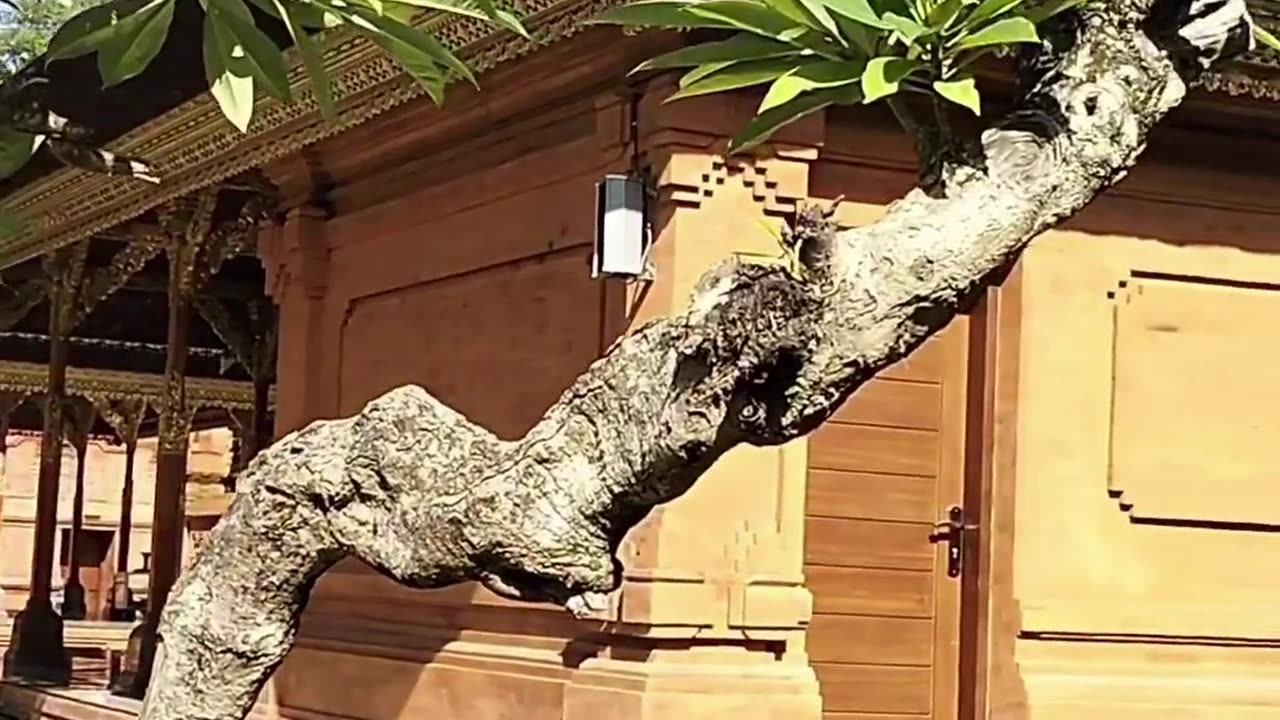Premium Only Content

Pura Jagatnatha Part. 11
The Pura Agung Jagatnatha Padmasana towered with its magah, Tintya, the symbol of Hyang Tunggal - the Supreme God made of gold, could be seen clearly from the Puputan Badung field. But in 1981, the sacred object was robbed by thieves.
That is the sad history of Jagatnatha Temple which stands on JL Mayor Wisnu, east of Puputan Badung Square, north of the Bali Museum, opposite Kodam IX/Udayana Headquarters in downtown Denpasar. Because it is located in the heart of the city, it is not difficult to reach the temple.
The temple is a place of worship for God in his manifestation as Hyang Jagat Natha - the Lord of the Universe. The word "natha" in Sanskrit not only means "king", but also "help" or "protection".
Pemangku Pura, Ida Bagus Mangku Widianegara from Gria Panti Denpasar said, piodalan in this temple is held every year, precisely on the Fifth Purnama Sasih. The types of upakara (offerings) offered are generally NyaturRebah, while in the Padmasana penataran held Caru Rsi Gana. The entire cost of pujawali is borne by the Denpasar City Government, as pengempon temple. The municipal government also provides sesari (honorariu) for sekaa kidung and shadow puppeteers who perform every pumama. "Before Denpasar City, the caretaker of this temple was the Bali Provincial Government," said Ida Bagus Widianegara.
In addition to the piodalan, devotees come from everywhere, pedek tanggil to Pura Agung Jagatnatha every Purnama-Tilem. People also pray during religious holidays such as Galungan, Kuningan, Saraswati, Pagerwesi and SiwaratrL Every Purnama-Tilem, prayers are led by Ida Pedanda Istri Manuaba Mas Sidanta from Gria Panti. While at the time of pujawali (nyejer for three days), puput by a number of sulinggih in Denpasar and surrounding areas.
Pelinggih
In this temple there is a towering Padmasana (symbol of the universe). No one knows for sure how many centimeters high this sacred building is. But some suspect, the height is about 15 meters. At the top of the Padmasana is a yellow-colored image of Aciritya or Tintya. In the past, the symbol of God attached to the top of the building was filled with gold, but because it had been robbed by thieves, now it is only painted with tinsel.
The Pelinggih Padmasana stands in the center, surrounded by a pond with clear water, lotus flowers adorn the pond. In addition to adding to the beauty of the pond, the lotus flowers also provide shade for thousands of fresh fish. Next to the Padmasana, there are also two temples called Tajuk standing on the left and right, in front of the Padmasana. Meanwhile, a temple where Ratu Niang resides stands to the east of the laul. There is also a temple where Dalem Karang and Ratu Made reside.
A bodi tree grows near Ratu Niang's shrine. As generally in other temples, there are also bale kulkul, pamiyosan, bale paselang, bale gong, candi bentart and kori agung (pemedal agung), Outside the temple there are two Panglurah temples.
Ida Bagus Meregeg is recorded as the first stakeholder in this temple. After the dwijati ceremony, Ida Bagus Meregeg mabhiseka Ida Pedanda Cede Sidanta Manuaba. Then all the affairs that must be handled by the pemangku are handed over to Ida Bagus Mangku Sena.
Guided by Parisada
Like other temples, Jagatnatha Temple also has a historical background. The establishment of this temple was the realization of a number of decisions that had been made at the Parisada Dharma Hindu Bali (as it was then called) Pasamuhan, November 20, 1961 in Campuan Ubud, Gianyar.
One of these decisions included: building a religious education center to foster and develop the lives of Hindus. In addition, to stem everything that undermines the joints of Hindu religious life, at that time, this country was indeed precarious. The Communist ideology was flourishing and it was feared that it could cause something fatal if it was not stemmed. So Jagatnatha Temple was established in the capital of Bali Province.
This temple functions as a place of public worship, without distinguishing the origin and soroh of the people, Parisada really wants to provide worship facilities for Hindus (who live in Denpasar) who come from various cities and regencies in Bali.
Who are the initiators of this temple? The construction of this temple is inseparable from the initiative of the late Captain TNI I Gusti Ngurah Pindha, B.A (while serving in Kodam XVI/Udayana) together with the Head of the Hindu Spiritual Service of the Military Region (Kerohindam) XVI/Udayana Lieutenant TNI (Titular) Ida Pedanda Gede Wayan Sidemen (aim) and Lieutenant TNI I Wayan Merta Suteja - who were both from Kodam XVI/Udayana.
The initiator conveyed the plan to the Commander of the XVI/Udayana Military Region (Pangdam) who was then Colonel TNI Soepardi. The Commander also responded to this plan with enthusiasm. So on January 16, 1963, a temple construction committee was formed and the inauguration ceremony was held on the same day. The chairman was Prof. Dr. Ida Bagus Mantra.*) He was assisted by several chairmen, secretaries, treasurers and equipped with sections. A month later, February 5, 1963, the committee held a meeting. The meeting, which was also attended by Bali Governor Anak Agung Bagus Sutedja, decided to build a temple named Pura Agung Jagatnatha.
However, due to the situation and conditions at that time, the committee apparently still had to work extra hard to realize this temple construction plan. For your information, at that time Mount Agung in Karangasem was writhing, even a few days after the committee meeting, precisely on February 18, 1963, the highest mountain in Bali began to erupt. The lava that spewed out cost many lives and property.
The natural disaster did not seem to dampen the spirit of the committee to realize the plans that had been made. Furthermore, on January 1, 1965, the committee asked Anak Agung Ketut Anggara from Banjar Belong, Denpasar to make a drawing of the building and at the same time lead the undagi (building experts) to work on the construction of the temple. Anak Agung Ketut Anggara was honored by the offer.
However, the implementation of the project still had obstacles. Because of the G-3Q-S/PKI, the temple construction process was hampered. According to a source, there were people who deliberately obstructed the temple construction process. However, the challenge actually ignited the flame of the committee's enthusiasm. On July 28, 1967, the base of the Padmasana building in the form of Bedawang Nala was completed. Furthermore, on October 15, 1967 the construction of Padmasana has reached the middle or middle part. And the entire padmasana building was successfully completed on December 13, 1968, meanwhile, the bentar temple was also completed on February 5, 1968. Well, then on May 13, 1968, precisely in the month of Purnama Jyestha, a pemelaspas alit ceremony was held so that the first Piodalan Alit could be held.
Slowly, but surely, the construction of the candi bentar and the entire wall around the temple was completed by January 1970. On Purnama Jyestha, May 21, 1970, the second Piodalan Alit ceremony was held. Furthermore, from August 17, 1970 to November 1970, two (2) kori agung, bale pelik sari or hale pengaruman and a bale kulkuL were completed.
Where did the funds come from to build this temple? Apart from the Bali Regional Government, funds flowed from the people's punia funds. Including the Commander of Kodam XVI Udayana, Col. TNI. Soepardi, extended some funds. For your information, the builders (undagi) work based on a mutual cooperation system with the spirit of ngayah. They come from Denpasar, Silakarang, Gianyar and a number of other areas. Meanwhile, the labor comes from the banjars in Denpasar City. They of course work with the spirit of ngayah, without ever calculating how much they should receive.
-
 LIVE
LIVE
Quite Frankly
2 days agoHookah Special: Found Footage, Workplace Folly, More Cringe Music Vids (8/23/25 Re-Run)
368 watching -
 LIVE
LIVE
LFA TV
13 hours agoLFA TV ALL DAY STREAM - FRIDAY 8/29/25
743 watching -
 12:38
12:38
AlaskanBallistics
19 hours agoNutrek Optics Coppertag 5-25x56mm Review
2.35K -
 LIVE
LIVE
The Mike Schwartz Show
4 hours agoTHE MIKE SCHWARTZ SHOW Evening Edition with Guests Dr. PETER MCCULLOUGH and JOHN LEAKE
4,179 watching -
 1:01:41
1:01:41
BonginoReport
9 hours agoAI & The Woke Indoctrination Ruining Childhood - Nightly Scroll w/ Hayley Caronia (Ep.123)
76.1K16 -
 1:17:29
1:17:29
Kim Iversen
6 hours agoTrotskyite Neocons: How MARXISTS Built the Modern GOP
80.1K113 -
 4:11:58
4:11:58
StoneMountain64
5 hours ago#1 Battlefield Mastery Session with the BOYS
19.9K1 -
 1:23:45
1:23:45
Roseanne Barr
6 hours agoDeclassifying Presidential Sex Slavery W/ Cathy O’Brien | The Roseanne Barr Podcast #113
102K52 -

FusedAegisTV
20 hours agoHollow Knight Silksong Waiting Room ~~ pt. I
20.7K6 -
 8:37
8:37
Warren Smith - Secret Scholar Society
8 hours agoJesse Lee Peterson EXPOSES How Stupid David Pakman Really Is
26.7K12